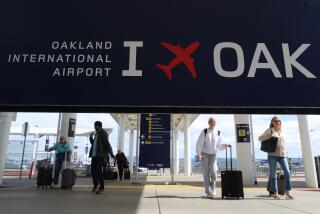Straighten Up and Fly Right
- Share via
To paraphrase an old ad slogan, the skies above Burbank are anything but friendly these days. As the long-running dispute over expansion of Burbank Airport flares up yet again, opposing sides are facing off in court. Court skirmishes aren’t too unusual, but this time the combatants all are members of the same fractured agency charged with overseeing the aging facility: the Burbank-Glendale-Pasadena Airport Authority. As the name implies, all three cities share power within the agency that controls the airport they jointly own. The arrangement worked well enough in the past and even fostered cooperation among the three cities on other matters of shared concern. But plans to expand the airport and build a more modern, safer terminal have splintered the agency into paralyzing factions pitting Burbank, which bears much of the airport’s negative impacts, against its partners.
The fighting reached a fevered pitch last year before all sides wisely agreed to a six-month “cooling-off” period. The truce ended abruptly this month, when Glendale and Pasadena sought a court order barring Burbank from opposing a larger terminal. Burbank fired back the next day with its own lawsuit trying to block the sale of 130 acres owned by Lockheed Martin Corp. to the airport authority. The land is necessary for expansion.
Both sides complain that they are at the end of their patience and that the other refuses to negotiate in good faith. If that’s the case, then maybe the board needs a good housecleaning. The authority exists to manage the airport cooperatively--so it remains profitable and equitable for all its partners--and to ensure that the operation safely serves the needs of its ever-growing customer base. That point must remain paramount.
Burbank’s complaint that it suffers the brunt of the airport’s impact is valid and should be considered seriously and with sensitivity by Glendale and Pasadena. Likewise, those cities have a right to expect that the airport remains profitable and safe over the long haul. Actually, if their public statements are to be believed, the three cities agree more than they diverge. All agree, for instance, that a new terminal is necessary. How big it should be is the main sticking point, along with a variety of other housekeeping issues--none of them insurmountable. The cooperative spirit nurtured over several decades should prevail over the combative stances adopted recently. In that spirit, the three cities met privately late last week and emerged optimistic that an accord could be reached without further bureaucratic bloodshed. Let’s hope that mood holds. The sniping serves no one.
More to Read
Sign up for Essential California
The most important California stories and recommendations in your inbox every morning.
You may occasionally receive promotional content from the Los Angeles Times.













